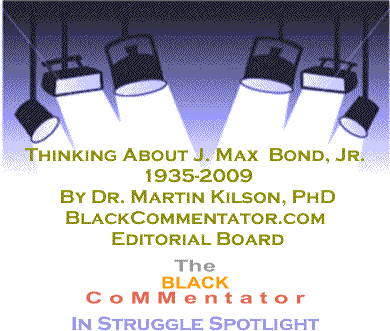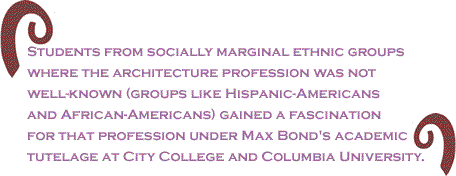
|
|||||||||||||||||||||||

|
|

Custom Search
|
|
 |
|
|
When a long close friend passes it's often the friend's soulful features that come to mind. Features that'll be initially missed. And, for me, this was true of J. Max Bond, one of my closest friends and civil rights activist confreres. Max Bond was a person riddled-with-soul, so to speak, by which I mean a person full-of-purpose. While most of us exhibit ordinary purpose as creatures on this troubled earth, Max Bond displayed something a bit grander. Let's call it “humane purpose”, which he exhibited evenhandedly, as it were, across different human spaces and situations. When I read the fine obituary on Max in New York Times (February 19, 2009), this facet of Max was captured marvelously by his close friend Gordon Davis, the founding chairman of Jazz at Lincoln Center, who said:
The humane purpose—liberal and progressive--that Max Bond conveyed in his professional years was, I believe, inherited from his ancestors. Max Bond and I were in the same age cohort (I just turned 78) and I first encountered his ancestral line over a half-century ago when I entered one of the Negro colleges as a freshman in 1949. The college was Lincoln University (Pennsylvania), founded just before the Civil War in 1854 by Anti-Slavery Movement White Presbyterians— “decent White folks” as my African Methodist clergyman father called them. Lincoln University was the first higher education institution for African-Americans in the country. Max Bond's uncle, the great sociologist Horace Mann Bond, was president of Lincoln University during my years there—a man and scholar of humane purpose which he exhibited gracefully but firmly across different human spaces, a gift that J. Max Bond Jr. also had. And, lo and behold..., when I first met Max Bond's parents many years later in the 1980s at his sister Jane Bond's home at Lincoln University where she taught French and History, I discovered that his father J. Max Bond Sr. and mother Ruth Clement Bond were also elegant persons of humane purpose, which they exhibited firmly and gracefully across different human spaces. J. Max Bond Sr. gained his PhD at the Univ. of Southern California in the 1930s, and spent part of his professional years administering education and agriculture-extension programs for that great yeomen Negro farmer community in the South, fighting to secure for Negro farmers a fair share of the New Deal federal government agriculture assistance programs (equivalent of today's Obama Administration “Stimulus Program”). Ruth Clement Bond, who grew up in the church of an African Methodist Episcopal Bishop, organized master quilt-sewing groups among rural African-American farm families during the 1930s.
As soon as one encountered J. Max Bond Sr. and Ruth Bond it was apparent that they radiated serious humane purpose. Fortunately for J. Max Bond, Jr., the persistence of his inherited humane purpose inner-gift was facilitated by marrying Jean Carey who also hailed from a professional-class African-American family. (Correction note - In an email to BC, Jean Bond informed us that her paternal grandfather was Dr. Richard Carey of Macon, Georgia not African Methodist Episcopal Bishop, Rev. Archibald Carey as Dr. Kilson originally stated and the Rev. Carey, Jr. was not Jean's uncle, rather Judge Archibald Carey was a cousin.) Thus, emanating from Max's family-line humane purpose ethos, Bond was well-suited to fashion professional years that exemplified progressive humane purposes. Indeed, even well-before his professional years, Max exhibited a “progressive esprit”, let's call it. It appeared while an undergraduate in Harvard College, where I first met Max when I was a Harvard graduate student during the 1950s. Thus, emanating from Max's family-line humane purpose ethos and reinforced by Jean's equivalent family-line ethos, Max Bond was well-suited to fashion professional years that exemplified progressive humane purposes. Indeed, even well-before his professional years, Max exhibited a “progressive esprit”, let's call it. It appeared while an undergraduate in Harvard College, where I first met Max when I was a Harvard graduate student during the 1950s. As the Civil Rights Movement was birthing in the early 1950s, two among just four Black students in Harvard College Class of 1952—James Harkless who was a Glee Club member and Walter Carrington who was head of the Liberal Union—launched a civil rights student group called the Harvard Society for Minority Rights. Harkless who grew up in an auto-worker's household in Detroit and Carrington who grew up in an NAACP-activist grocery owner's household in Everett, Massachusetts, had sustained an activist spirit while Harvard College students. Harkless and Carrington later went to Harvard Law School and became civil rights lawyers. Max Bond—along with nine Black students living in Harvard's Stoughton Hall (there were 11 African-Americans in the College then)—had experienced White students' racism when White students burned a five-foot high KKK Cross in front of their dormitory. So Harkless' and Carrington's Harvard Society for Minority Rights (HSMR) was responding to this racist affront. Max and one of his close African-American buddies, James Bows, joined ranks with HSMR, and I think it was Max who first informed me of HSMR during my 1953 Fall Term at Harvard Graduate School resulting in my joining ranks with James Harkless' and Walter Carrington's HSMR. By the end of the 1953-1954 Harvard College year and later, other activist-minded African-American Harvard undergraduate and graduate students joined HSMR (such as Melvin Miller, Kenneth Simmons, Tom Wilson), as well as a small group of activist-minded White students, like Louis Sharpe, Michael Tanzer, Deborah Wolfe, Tony Winsor, Jim Pearlstein, and Robert Heifetz. On the other hand, some African-American Harvard undergraduate and graduate students kept their distance from HSMR, such as graduate students Nathan Huggins and Lawrence Howard, and undergraduate students Melvin Kelley, Harold Scott, and Clifford Alexander. The latter two subsequently became progressive civil rights-oriented professionals—Scott in Drama Studies, Alexander in the legal profession—and Melvin Kelley too discovered an activist outlook as a novelist and essayist.
One important off-shoot of what I dub Max Bond's “progressive esprit” was his quite fierce intellectual gregariousness. His confreres in the architecture field and the many students he trained and mentored at New York's City College and Columbia University knew this facet of Max well. This same “progressive esprit” informed what might be called Max Bond's “human advancement gregariousness”. One
might say that Max had a kind of hound-dog-sniff-gift for ferreting
out opportunities to apply this feature of his “progressive esprit”.
One such opportunity surfaced in the early 1960s as the first progressive
independent African state of Ghana, under President Kwame Nkrumah,
Max and Jean Bond were part of an intellectually keen and progressive cadre of African-American professionals who visited Ghana to contribute as best they could to the first progressive independent African state's viable modernization. They were a first-class and fascinating cross-section of the progressive African-American intelligentsia, starting in the first two years of the Nkrumah Government, 1958-1959, to the end of 1966 when a military coup overthrew the Nkrumah Government. I think of the great sociologist Professor St. Clair Drake who directed important urban working-class studies of cities like Cape Coast and Takoradi, and organized Sociology Studies at the University of Ghana. I also think of Maya Angelou–later a prominent poet-who organized Ghana's Dance Studio and taught Modern Dance at the University of Ghana. I think of the novelist Julian Mayfield who taught at the University of Cape Coast and wrote speeches for President Nkrumah. I think of Dr. Olivia Cordero, Mayfield's spouse who operated the only prenatal medical center in all of Accra. I think of Jean Hutson, a top-rank librarian at New York Public Library who went to the University of Ghana to help advance its library system. I think of Tom Feelings, a major illustrator who taught art at the University of Cape Coast, and I think of Julia Wright (daughter of the novelist Richard Wright) who taught French at the same institution. I think of Julius Belcher, a Philadelphia accountant who worked in the early Nkrumah Administration. I think of Preston King, a political scientist who taught several years at the University of Ghana. And there were others—economists, engineers, lawyers, scientists, business persons, etc. Autocratic features of the Nkrumah Government were not to Max Bond's liking, nor to mine or to most other progressive African-American professionals whom I knew that worked in Ghana, that's for certain. Max and Jean, St. Clair Drake, Maya Angelou, Julian Mayfield, Dr. Olivia Cordero, Tom Feelings, Preston King and others attempted as best they could to cultivate and advance democratic and progressive patterns. African-Americans interested in new African states like Max Bond and myself considered it a sad and painful outcome when autocratic, corrupt predatory-elite regimes prevailed in Africa from the late 1970s onward, resulting in massive modernization decline and violent governance of Failed States like Uganda, Liberia, Zimbabwe, Nigeria, Gabon, Equatorial Guinea, Zaire-Congo, etc.
Following the rise of military governance after the 1966 coup, Max and Jean and others who sojourned in Ghana returned to the United States. The 1970s onward saw Max launch and advance a top-flight architecture firm. He designed superb urban edifices, like the Audubon Biomedical Science & Technology Park at Columbia University in upper-Manhattan. Of this edifice, the New York Times architecture critic, Herbert Muschamp, observed that Max Bond's design “...Gives new meaning to the term civil engineering: it seeks to balance by formal means the competing stakes in the land the building will occupy.” Bond brought this gift for architecture innovation to other urban edifices he designed, like the Schomburg Center for Research in Black Culture in Harlem, the Birmingham Civil Rights Institute in Alabama, and the Martin Luther King Jr. Center for Nonviolent Social Change in Atlanta, Georgia. (Correction note - Additionaly, in the email to BC from Jean Bond, the following statement was provided regarding Dr. Kilson's account of the Ghana/Nkrumah years: "I do quarrel somewhat (as would Max, I'm sure) with Martin's description of our feelings about Nkrumah, whose professed socialist orientation is largely what spurred us to go to Ghana. By the way, we remained there for approximately a year-and-a-half after the coup, having always intended to return to the U.S. eventually even if President Nkrumah had remained in power.") Max Bond's innovativeness was visible, too, in those intertwined roles of educator-teacher-mentor. Students from socially marginal ethnic groups where the architecture profession was not well-known (groups like Hispanic-Americans and African-Americans) gained a fascination for that profession under Max Bond's academic tutelage at City College and Columbia University. The nascent careers of the two generations of African-American architects who came along after Bond's generation were assisted by Bond; among them were my nephew Thomas Kilson Queenan and also one of my sons-in-law Philip Page, both of whom studied architecture at Syracuse University. Max Bond shared the Bond ancestral ethos of advancing progressive humane purposes in one's professional work with his brother George Clement Bond. A professor of cultural anthropology at Columbia University's Teachers College, George Bond was a brilliant Director of Columbia University's Institute of African Studies. For over a decade and with shoestring funds, Professor Bond sustained an intellectually vibrant range of seminars and conferences that advanced our understanding of socio-political crises in Africa's Failed States. Max Bond also shared the Bond ancestral ethos of advancing progressive humane purposes in one's professional work with his cousin Professor Julian Bond of the University of Virginia, who during the 1960s was a leading figure in the Students Nonviolent Coordinating Committee (SNICK), was a civil rights activist state legislator in Georgia, and has provided astute leadership as chair of the NAACP's National Board. Thus in the passing of J. Max Bond, Jr., a curtain closed on the life of an exemplary African-American professional. Forged in the crucible of a three-generation progressive African-American leadership family tradition, J. Max Bond Jr. advanced upon the Bond-Clement family leadership tradition with wisdom, boldness, and style. May Max Bond's example gain that broad recognition it so truly warrants. BlackCommentator.com Editorial Board member Martin Kilson, PhD hails from an African Methodist backgound and clergy: From a great-great grandfather who founded an African Methodist Episcopal church in Maryland in the 1840s; from a great-grandfather AME clergyman; from a Civil War veteran great-grandfather who founded an African Union Methodist Protestant church in Pennsylvania in 1885; and from an African Methodist clergyman father who pastored in an Eastern Pennsylvania milltown--Ambler, PA. He attended Lincoln University (PA), 1949-1953, and Harvard graduate school. Appointed in 1962 as the first African American to teach in Harvard College and in 1969 he was the first African American tenured at Harvard. He retired in 2003 as Frank G. Thomson Professor of Government, Emeritus. His publications include: Political Change in a West African State (Harvard University Press, 1966); Key Issues in the Afro-American Experience (Harcourt Brace Jovanovich, 1970); New States in the Modern World (Harvard University Press, 1975); The African Diaspora: Interpretive Essays (Harvard University Press, 1976); The Making of Black Intellectuals: Studies on the African American Intelligentsia (Forthcoming. University of MIssouri Press); and The Transformation of the African American Intelligentsia, 1900-2008 (Forthcoming). Click here to contact Dr. Kilson. |
|
Any BlackCommentator.com article may be re-printed so long as it is re-printed in its entirety and full credit given to the author and www.BlackCommentator.com. If the re-print is on the Internet we additionally request a link back to the original piece on our Website. Your comments are always welcome. eMail re-print notice
If you send us an eMail message we may publish all or part of it, unless you tell us it is not for publication. You may also request that we withhold your name. Thank you very much for your readership. |
|
| |
|
| March
26 , 2009 Issue 317 |
|
| Executive Editor: Bill Fletcher, Jr. |
| Managing Editor: Nancy Littlefield |
| Publisher: Peter Gamble |
| Est. April 5, 2002 |
Printer Friendly Version
in resizeable plain
text format or pdf
format. |
| Frequently Asked Questions |
 |

|
 |
 |
 |
| |
| |







































